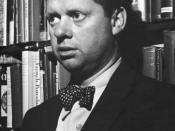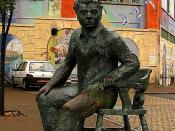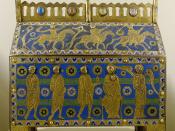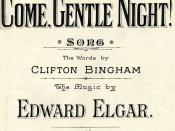This essay it is going to be a comparison between "Do Not Go Gentle Into That Good Night" by Dylan Thomas and "Death Be No Proud" by John Donne.
"Do Not Go Gentle Into That Good Night" is about the poet telling his father not to die, and giving different examples of people that did not die easily, and, at the same time, list his father's qualities.
It starts with the line that is also used as the tittle, "Do not go gentle into that good night". The word "gentle" immediately captures my attention. It is grammatically incorrect. The right word would have been gently. I can find many reasons of why the author decided to use "gentle". Maybe because gently sounds kind, happy and this feelings are not the ones that are tried to be expressed in this line. Another possibility is that the word "gentle" describes a particular state of being, while an adverb describes an action.
In that way, the word "gentle" is describing the author's father and, at the same time, giving a stronger meaning to this line.
In this phrase, the word "good" also stands out. If we take the word "night" to mean death (probably that is what it means) why then "good night"? It is a contradiction? Because, if death is "good", why to fight it? This gives me the idea that the author is being selfish and that he is confused. On the other hand, "good night" it might be used as a farewell. In that case he is also fighting against his ideas because of the words "Do not" written at the beginning of the sentence.
The second line of the first stanza, "Old age should burn and rage at close of day" is quite strange. The word "old" at the front of the line makes no sense in the context. "Old" people are weak and get tired easily, so the verbs "rave" and "burn" describe much better a young person's actions, but can be a direct reference to his father; in that way the sentence makes perfect sense. The whole of the line might mean "father, fight against death" but it can also be interpreted in other way; it can also be a desperate, worried, confused and frustrated cry of a desperate man, meaning, "Father, please do something". Notice that the poem seems to become angrier. The words "good" and "gentle" are quite weak, and "burn" and "rave" have a higher intensity. I highlight the word seems because of the words "Do not". These are not weak words, the d sound is strong and they also are the words that appear in the Ten Commandments. Then, why such weak words as "good" and "gentle go in the same line as "Do not"? The third line of the first stanza "Rage, rage against the dying of the light" is obviously a command to his father, as the entire stanza is. Maybe that is why he uses "Do not"; because it appears in the Ten Commandments so it gives a strong and authority tone to the stanza.
The repetition of "rage" gives an idea of a violent emotion. We can say now, for sure, that the poem is becoming angrier.
The second stanza starts with "Though wise men at their end know that dark is right" By "wise man", who is he referring to? Old man because they have experience?; philosophers? Maybe it refers to the three wise men and it brings religion up. The words ""ædark is right" brings back the contradiction we found at the beginning of the poem with "good night". Is the poet, by this statement, admitting that death is good and natural? On the other hand, he might be bringing the religious concept of death and then going to heaven.
The second and third lines "Because their words have forked no lightning, they Do not go gentle into that good night" it can be translated as because the "wise men" actions have had no impact or not as much impact as the "wise men" do not want, if they are not famous, or as famous as they want, to die. Another possibility is that their words did not spread as much as they wanted them to (because the words "forked lightning" gives the idea of a desire of spreading their ideas as much as possible). In my opinion, everyone is afraid that, when they die, eventually they will be forgotten. Intelligent people, as Einstein, Aristotle and Shakespeare are imperishable, and that is what the "wise men" try to accomplish, in other words, eternal life in people's memory.
The third stanza begins with "good men, the last wave by, crying how bright their frail deeds might have dance in a green bay". "Good men" might mean priests and "frail deeds" their attempts to be good.
The last line gives me the impression of standing on a precipice looking down to the sea. The word "dance" gives an idea of water moving. Generally, when you are looking at the sea from a distant place, you can realize that water is moving because of the flashes of light that reflects on the water. Maybe, what the author is trying to say is that if the "good men"ædeeds" did not reflected in people as light reflects in water, they feel unsatisfied, and they don't want to die.
"Rage, rage against the dying of the light" is the next line, and as "Do not"æ" did in the second stanza, it changes its meaning. (This continues all over the poem) Stanza four refers to "wild men". I like to think that by this the author means poets. Poets have to be "wild"; all over, history poets have been breaking grammar and social rules, so they can be called "wild". "Wild" also gives the idea of people that have lived their life fully. The line "who caught and sang the sun in flight" also supports this idea. To have "caught"æthe sun" is impossible, an exciting thought. Moreover, to "sang the sun" it is not only impossible, but it expresses almost a religious emotion. So, why "too late, they grieved it"? Maybe this means they have discover that their glorious moment (youth) has gone by and they can recover it, so they want to stop sunset (time) as long as they can.
In the first line of the fifth stanza the word "grave" gives immediately a idea of death, or of a serious man (Notice that many of the words in this poem are ambiguous), who "sees with blinding sight". Who has a sudden understanding? "Blind eyes could blaze as meteors and be gay"? By "blind eyes" he might refer to the fact we close our eyes when we die, he is saying that death can be happy.
The last stanza of the poem starts with a very low intensity, but, in the way I see it, it is profounder than the rest of the poem. It is the moment in which the poet, after he had released all this fears and feelings, he can see clearly what it is happening.
The "sad height " can be understand as a "higher" level of understanding, a peak of life, or maybe both.
The stanza continues with the words "curse, bless me". I also see two meanings in the context. It might continue the contradiction that started at the beginning of the poem or be a cry that means "Please, react".
The poem finishes with the two lines that repeat throughout the poem "Do not go gentle into that good night, Rage, rage against the dying of the light".
Perhaps this poem was made based on the author's father, but, because of the emotions, fears and desperation it transmits, it also makes me think that represents the author's feelings about death. The fact that this might be the first time that he sees someone dying may be the cause of all this ideas that start flowing to his head. "Rage", for example, is probably one of the feelings that the author is now experiencing. We should be open to that possibility.
"Death Be No Proud" is about the author giving logical arguments to show why death should not be proud. It is a very religious view, it is addressed to death, unlike the first poem that is addressed to the author's father. Instead of giving examples as "good men" and "wise men", it gives general ideas. The first poem is emotional, "Death Be No Proud" it is pure logic. The fact that "Do Not Go Gentle"æ" has no religious statements, except perhaps for "good night", is another difference.
The poem ("Death Be No Proud"), in general, has a regular rhythm, that breaks in three lines to emphasize certain words.
In line one, the words "Death Be No Proud" are the firsts ones in the poem and they do not follow the rhythm pattern. Being monosyllables and by being the first word a d word, it gives the poem a strong start, as "Do not go gentle"æ" has. The word "Mighty" is also emphasized. Until now, the poet has accused death of not being as "Mighty" as she thinks she is, so that's a possibility of why the word is highlighted. In the second line the poets stars using caesura to give a certain intensity to same phrases as "thou art not so". He repeats this with "poor death" (in both sentences all the words are monosyllables so they are even stronger) in an ironic way. Unlike the first poem, in which people are frightened of death and Dylan Thomas shows his own fears, John Donne shows us his scorn.
In the third and fourth line, John Donne gives the first argument of why he thinks death does not kill anyone, because when someone dies, he or she goes to heaven, to eternal life, so they are not dead.
In line five he compares death with "sleep" and "rest". He says that, if resting is good, death must be good also. The idea of death being good is also suggested in the first poem with "good night" and "dark is right".
When John Donne suggests that the good and the young die first is because they are God favourites, (a very religious way of looking at it) in lines seven and eight with the words ""æour best men with the do go, rest of their bones and soul's deliver". Dylan Thomas also talks about the "good men", but he says they fight death because they never feel good enough, in a way, he is saying the opposite of Dylan Thomas.
In line nine, the rhythm of the poem breaks again to emphasize "thou art slave of Fate, Chance, kings and desperate man" to make it more insulting and to demonstrate that "mighty" death depends on others. He also insults death but reminding that she does not have nice friends, friends as "war", "poison" and "sickness". Until now, the poem makes me feel as if human beings are defeating death and she is getting smaller and smaller when an argument is given. This tone remains all over the poem, unlike Dylan Thomas's poem, that changes its mood in every stanza. This is what gives an emotional tone to the poem, and what makes me feel that John Donne feels very confident, that he has no doubts about what he is talking about. The facts that he is a priest made me think that that is why he has no doubts, because he feels he is going to heaven.
He continues insulting death when he compares it to "poppy and charms". At that time, drugs and magic were strongly condemned, so it is a huge insult to say that they are even better as he says in the twelfth line.
In line thirteen he just repeats that we don't die, because we "awake" (he compares death with "sleep" again) in eternal life.
In the last line he summarizes the entire poem in one line. He also gives a strong end to the poem, because he uses monosyllables and caesura to emphasize the final paradox "Death, thou shalt die". I say paradox because if death has to be wherever someone is dying, she has to be present in her own death, but, if she is dead, how can this be? Concluding, "Do Not Go Gentle Into That Good Night" and "Death Be No Proud" have in common the fact that they are addressed to someone, they talk about death and they have a strong start.
They differ in the tone they use, the feelings of each author towards death, and the fact that "Death Be No Proud" is very logical and "Do Not Go Gentle"æ" very emotional.
Although both poems are very different, I enjoyed both in different ways. I felt quite touched by Dylan Thomas's poem because I see reflected my own fears in his writing. However, John Donne's cynicism is a new way to confront the idea of dying, so it makes it quite an interesting poem to read.





